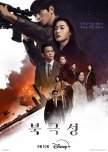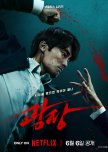
A feast for the senses with an underwhelming ending.
Chang'an is a city of splendor, temptations, and secrets — a truth no one understands better than Wu Zhen. By day, she endures mockery and admiration as the rebellious and unwed daughter of a duke and the only sister of the queen. By night, she is the revered Cat Lord, the fierce protector of the Demon City that lies beneath Chang'an, a position that keeps the mortal and demon realms in a delicate balance. She has long been content with this arrangement, using society's scorn of her unconventional lifestyle as a means to keep her secrets safe. However, her carefully constructed double life is jeopardized by the arrival of Mei Zhuyu, the reserved and calculating newcomer at the Bureau of Mystic Investigations, whose agenda is as hidden as her own. With the looming return of an ancient and devastating enemy, and the worlds they swore to protect under threat, these two opposing heroes are forced to become unlikely and unassuming allies. As their destinies intertwine, their relationship blooms into one that is as complex as the secrets they keep.From the very beginning, Moonlit Reunion lures us in with its breathtaking aesthetic, a world brought to life by the stunning visuals and enchanting osts. The vivid contrast between the mortal world and demon underworld is one of my favorite features in this drama. For instance, when the camera cleverly glides through the Ruyi Pavilion in episode one, it reveals the extravagant fashion of the elite, roaring laughter of the patrons, rich melodies of the musicians, and mesmerizing dances of the performers. I remember thinking that nothing could rival this visual excellence, and then something did. We are introduced to the Demon Market — an unparalleled explosion of vibrancy, chaos, and richness in a world usually enveloped by night — and my jaw hit the floor. This duality extends to the very atmosphere, as the drama excels at using green and blue lighting to signal the mystical encroachment upon the mortal realm. The seamless combination of dazzling cgi, skillful cinematography, and beautiful soundtracks is an absolute feast for the senses.
The diverse cast of characters are a delight to watch. Wu Zhen and Mei Zhuyu are compelling leads and true equals in their cleverness, competence, and power. It is the kind of relationship I can appreciate for the main couple of any story, as it makes for a well-balanced partnership. However, Moonlit Reunion is significantly elevated by its ensemble of supporting characters (such as Liu Tai Zhen, Mei Si, Hu Zhu, Shuang Jiang, Xuan Hui, Huang Yi, and Mei Wen Hua), who make this world feel complete. I am particularly fond of Liu Tai Zhen and Mei Si because of their nostalgic charms that are reminiscent of classic Hong Kong cinema; and their evolving relationship is captivating, making me tune in daily to watch their romance unfold. The exploration of the varied dynamics in this drama, even between characters with seemingly little reason to interact, also adds layers of unexpected depth to the narrative. For example, Mei Si and Xuan Hui make the most surprising and endearing duo of friends — they are my absolute favorite.
Among all the dramas airing at the same time, Moonlit Reunion was the one I had the highest hopes for — that is, until the story got close to the end. With less than half the episodes left, the story takes a sharp turn for the worse following the fallout between Wu Zhen and Mei Zhuyu. It is a transition made all the more infuriating by Mei Zhuyu's sudden change in personality. The shift might be brief, as he does revert back to his old self, but the damage done leaves a lingering foul taste in my mouth. As the narrative progresses, the high-stakes plot that has been so meticulously crafted falters. Instead of the epic showdown that was initially promised, the villains are disappointingly taken down in a series of anticlimactic defeats. The death of an important character makes me question my emotional investment in the story. It lacks the intended impact the writers aimed for and is overshadowed by the far more heartbreaking demise of an earlier supporting character. The rushed finale feels lackluster, leaving the story with some unanswered questions that I cannot delve into without entering major spoilers territory.
Although its underwhelming ending marred by wasted potential sets the story back, Moonlit Reunion is still a worthwhile watch. The drama's gorgeous cinematography, captivating world, and compelling characters make it a memorable, even if flawed, experience for fans of rich visual storytelling. It has been a few days since I completed this drama, and despite not being fully satisfied with the execution of the events leading up to the conclusion, I still can't help but miss the story and its characters. Perhaps in the end, the real reward lies in the journey itself, no matter how imperfect the destination.

A beautiful tale of resilience, sisterhood & patient love, but S2 suffers from inconsistencies.
I just want to start off by saying that I absolutely loved season one of Flourished Peony. While the story itself wasn't anything new, the delivery was refreshing and it really resonated with me. I was captivated by the complexity of the characters, the pacing, the cultural richness of the Tang dynasty, the mature relationship and healthy communication between Mudan and Jiang Chang Yang, and the nuanced female friendships. Flourished Peony was incredibly well-written with beautiful cinematography and fantastic acting, and if the story had ended with just the first season, I would've been perfectly content with that.Maybe that was why I was disappointed when I started watching In the Name of Blossom and realized that it was lacking many of the elements that I previously praised. For more than half of season two, the healthy communication between Mudan and Jiang Chang Yang was replaced with cliches and overused tropes, such as angsty misunderstandings — the foolish idea that you must push someone you love away in order to "protect" them. This extended the slowburn romance for even longer than it was necessary and dragged down the plot's already slow pace.
On top of that, there was a decline in the quality of storytelling / writing as well. For instance, there was a plot twist that occurred at the midway point, and although it was supposed to be a pivotal moment for Mudan, it was so poorly executed and underdeveloped that it became a jarring experience instead of a meaningful one. So much of season two was wasted on the miscommunication and unspoken feelings between our main characters, and I felt the writers could've used this time to establish the important plotlines in this story more effectively instead. Had I not known that season one and two were filmed together, I would've assumed they were produced by two completely different groups of creatives.
Despite my frustrations with season two though, I did appreciate that the story at least stayed true to its values and themes until the very end. The strong performances of the actors, the stunning cinematography, the message of fighting for a better tomorrow even when it felt like all hope was lost, the main couple's fate despite its rocky journey, and the inspiring female friendships — all of this made a weak narrative more tolerable for me and I found myself enjoying the second half of the season even with all of my criticisms.
At its core, Flourished Peony (and In the Name of Blossom) was a story about women empowerment and the beauty of sisterhood. It taught us the significance of women having their own identities, dreams and purpose — regardless of their relationships with men. It shed light on the brutality of domestic abuse and it encouraged us to offer hope and support to those struggling in toxic cycles. It reminded us that strong women came in many forms: some are physically strong like Zhu Fu, some are resilient like Shengyi, some are compassionate like Lv Geng Chun, some are graceful like Consort Shu, some are generous like Xiao Xuexi, some are independent like Aunt Feng, and some are intelligent like Mudan. We should celebrate our differences and strengths as women instead of seeing them as reasons for competition and division.
One singular message was constant throughout both seasons: Life is filled with hardships, and there will be times when it feels like there is no way out of the darkness. But you don't have to suffer in the silence alone. It is okay to seek help; it is okay to accept it. The strength of others can be a beacon of hope that reduce your worries, aid you in overcoming your challenges, and help you find your way back to the light.
In the end, In the Name of Blossom paled in comparison to Flourished Peony, but I do think it is still worthy of watching for those who are invested in the main characters' journeys and want to see how their stories conclude. However, I only recommend it for those who have the patience and tolerance for the criticisms I mentioned above.

A delicious enemies-to-lovers romance, bloody bites and all.
How fast does it take for an arrow to reach its target?In the hands of a master? Seconds.
That is also how fast loyalty seems to shift during times of unrest in our drama, Fated Hearts.
Susha and Jinxiu are rival kingdoms. Just as the Feng Battalion of Susha is about to win the key battle of Pingling city in Jinxiu, the first prince of Susha, Feng Suige, gets gravely struck down by the infamous red-clad archer and general of Jinxiu, Fu Yixiao. A singular arrow is all it takes to miraculously turn the tides of war. With Feng Suige's life hanging in the balance, the Feng Battalion has no choice but to retreat. However, instead of celebrating this victory as a national hero, Fu Yixiao finds herself fleeing for her life a day later, pursued by a swarm of assassins. What happened? Who is after her? And why do they want her dead? Fu Yixiao isn't quite sure. She is injured and alone. She has no trustworthy allies and no memories of the events leading up to this moment. In order to uncover the truth and survive, Fu Yixiao reluctantly agrees to an alliance with the man she tried to kill, Feng Suige.
The tension. The violence. The chemistry. Just wow. Dare I say, Fated Hearts is one of the best enemies-to-lovers romances of 2025? Fu Yixiao and Feng Suige didn't just start off hating each other — they were out for blood. It was honestly difficult for me to watch the first few episodes because of all the whipping, kicking, punching, slapping, and biting (especially the biting!) Ironically enough, the brutality was also what made the story so compelling for me. It sparked my curiosity, and I wanted to know how two people who despised each other this much could possibly ever fall in love. I guess the writers knew exactly how to hold my interest, because they delivered just that. Only through a series of shared life-or-death experiences did Fu Yixiao and Feng Suige began to trust and eventually respect each other. It was so delicious to watch unfold, because as our protagonists fell in love, so did I with their unhinged characters — and I say this with admiration.
Fu Yixiao and Feng Suige shine brightly as individuals, but they are absolutely magnetic together. They are strong, selfless, loyal, and petty. So petty, they take the phrase "an eye for an eye" literally. They are each other's equal, and I appreciate this so much in a story like this. I've seen so many fierce male leads in dramas before, but none of them can compare to Feng Suige. What a man he is. His commanding presence and sass are uniquely his own. His charisma is so captivating, I couldn't keep my eyes off of him every time he walked into frame. Chen Zheyuan effortlessly brought Feng Suige's intimidating and softer sides to life, and he really impressed me in this role. And Fu Yixiao? She is just as wonderful a character. She carries herself with such believable confidence that I never once questioned her abilities as a battle-hardened general. I admire her sharpness and discipline. Even though she used her cold exterior as a shield, her kindness peeks through, and I couldn't help but root for her from the start. Li Qin's acting is mesmerizing in this role, I am officially a fan.
Fated Hearts' exploration into family, betrayal, and second chances is nothing new, but did I still enjoy it? Yes. I have a soft spot for stories involving close family units — whether they are blood-related or bonded by choice — which is why when the loyalty of some characters was tested, I took their betrayals personally. The fallouts were sometimes predictable, and yet, they still succeeded in making my blood boil and my stomach turn. After all, how can humans be so selfish and let their desires break even the strongest of bonds? I don't know the answer to that question, I don't know if any of us do. Although, I am glad that characters weren't completely written off just because they've made mistakes. They were allowed the chance to reflect on their actions, grow, and change their fate — if they chose to do so. Some of my favorite moments came from characters I had misjudged. I was completely surprised by some of the choices they made in the end. I liked that the protagonists' relationships with the supporting cast were just as important as their relationship with each other.
What truly amplifies the emotional impact in this story for me are the beautiful cinematography and unforgettable osts. I've seen some criticisms for the loud background music, but personally, I didn't mind it. I don't know how many times 'Raging Waves' by Lars Huang played over a crucial scene, but I know that every time it did, it moved me to tears. I distinctly remember the scene where Fu Yixiao was surrounded by enemies, and she had to surrender her only weapon in order to de-escalate the situation because someone she cared for was held captive. The enemies decided to attack anyway, and Yixiao thought all hope was lost... then Suige suddenly appeared. The camera panning from Yixiao's shocked face to Suige's protective gaze and the emotional surge of 'Raging Waves' playing in the background added so much depth to this scene. It was the very moment I started to ship the main couple, because it gave me chills. And there were so many instances in the drama that were just as touching to me for the same reasons.
I would've gave Fated Hearts a perfect rating if it weren't for the issues I had with the antagonists. I like complex antagonists as much as the next person, and I don't mind time being dedicated to fully flesh them out, but their origin stories and motivations must make sense to me. Unfortunately, most of them failed to convince me here. There are no grievances they suffered in the past that could possibly justify all the evils they committed in retaliation. The extremity of their actions felt a bit out of place. Almost like the cartoon villains you see in children's shows. It didn't help that instead of slowly easing us into the antagonists' backstories, the writers decided to hit us with them all at once. It made those episodes incredibly slow for me to sit through, and for a second, it even made me question if I should continue. Thankfully, a few of the antagonists did grew on me (against all odds), and all of them got the consequences they deserved by the finale. Too many times do heroes forgive and forget and leave the villains go unpunished. That wasn't the case here, and it was so refreshing. Their satisfying endings made suffering through the draggy episodes worth it.
I was in the middle of a drama slump when I started watching Fated Hearts and I was really hoping it would be the one to pull me out. Thankfully, it did just that, and I became addicted. Fated Hearts might not have been perfect, but I was completely engrossed in this world and I became emotionally invested in the lives of Fu Yixiao and Feng Suige. Did I learn something new and life-changing that I didn't know before? No, but this drama gave me something exciting to look forward to everyday. Plus, the drama's take on the importance of family, the value of loyalty, and the gift of second chances were nice reminders, even if they were a bit generic. For that, Fated Hearts is one of my favorite enemies-to-lovers romances of 2025. I wholeheartedly recommend it to all fans of this genre. Sit down, buckle in, and enjoy the emotional rollercoaster ride.

Moving was emotional, engaging, and memorizing.
The beginning of this drama was very slow, and if I had anything else better to watch, I probably would've dropped it within the first two episodes. Thankfully I didn't, because Moving was one of the best kdramas to have blessed my screen.There were no boring characters. Every single character — no matter how big or small their role was — had a story to tell, and each story was as engrossing as the next. It was easy to root for the heroes because of how likable they all were, but I also found myself sympathizing with the villains and even praying that they would get their happy endings too. Every life was significant, even those nobody would miss.
I know that some people hated the flashbacks for the parents, and they found the parents' backstories to be boring, but I absolutely loved them and I especially loved the writers' ability to weave moments from the past into the present.
Aside from the pacing in the first few episodes, I had no other complaints.
Moving was emotional, engaging, and memorizing, and I need these writers to teach a master class on how to craft fully-fleshed out characters and gripping storytelling.

A love story that transcends time and space.
In a xianxia romance that spans multiple lifetimes and universes, When Destiny Brings the Demon chronicles the journey of Liao Tingyan as she is unwillingly transmigrated into a fantastical realm of immortals and demons. Blindsided by her abrupt displacement, she attempts to carve a quiet and lazy life for herself here — but fate has other plans. Against her wishes, she falls under the mercy of the notorious grandmaster, Sima Jiao, who is said to have a cruel heart and fiery temper. However, through their forced coexistence, she learns that beneath the lord's hotheaded exterior, he is a complex and lonely soul.The initial episodes are weighed down by an influx of info dumping, but bear with it, because your patience will be rewarded with one of the sweetest love stories to emerge from cdramaland this year. Liao Tingyan and Sima Jiao's chemistry needs to be studied. From enemies, to servant and master, to friends, to lovers — their relationship develops fast but believably so. In a world where they are both outcasts and no one is to be trusted, they are drawn to each other. Passionate, angsty, selfless — I find myself gushing over all of their tender moments, and there are so many of them. You will laugh, cry, rage, and fall in love with their love story.
The actors, Wang Ying Lu and Arthur Chen, are sensational in these roles. In less capable hands, Liao Tingyan would have come off as annoying, considering how passive and meek her character started off as. Instead, Wang Ying Lu is able to make Tingyan relatable, funny, and endearing. She effortlessly transitions Tingyan from a damsel in distress into a force to be reckoned with — someone who not only can protect herself but her loved ones as well. Arthur Chen is also perfectly casted as Sima Jiao, brilliantly portraying his loneliness, pain, and rage in a way that brings justice to the character. Watching Sima Jiao's growth from a man who is suspicious of everyone into a man capable of compassion, trust, and forgiveness because of his love for Tingyan is as healing for him as it is for me to watch. The performances of these actors moved me and I have a new profound respect for the both of them.
Aside from the characters, there are also so many other things to love. The cgi is gorgeous and it adds so much vibrancy and personality to this world. The visual impact would not have been as memorable without it. The osts are haunting, marvelously complementing the story and elevating every scene to a new level of enjoyment. I constantly hum the melodies even when I'm not watching the drama and thinking about the music evokes a strong feeling of longing for the characters and their stories. The fight scenes are riveting — it is obvious how much thought and intentions the director and action choreographers put into those sequences.
My two biggest complaints are probably that the plot was secondary to the romance and the pacing was very slow at times. There are moments in the drama where the romance will be developing with ease, but the plot isn't moving at all. The conflicts in the first half of the story are repetitive, stalling the plot. Personally, I feel the drama could have been reduced to fewer episodes to create an even more engaging story. However, I recognize that this will cut back on some of the romantic scenes, and this will be a great loss for the drama since the romance is such an important factor in the story. Therefore, I am able to overlook the drama's weaknesses in this respect.
After finishing When Destiny Brings the Demon, I am only left with positive feelings of love, admiration and satisfaction for the story. Given the genre and the censorship placed on dramas with transmigration, I couldn't have asked for a better ending. The writers neatly conclude the story with no loose ends. It is definitely a love story that transcends time and space, worthy of experiencing, and I highly recommend it for the romance lovers.

What would you do for those that you love?
What would you do for those that you love? Would you give up your happiness? Would you give up your life?These are the questions at the heart of Twelve Letters, a fantasy and mystery drama about love, found family, sacrifices, hope, and the power of choice. The story is set across two timelines — Meiwan Town in 1991 and Beixing City in 2026 — and it revolves around our two protagonists, Ye Hai Tang and Tang Yi Xun. The world was not kind to them in 1991; their lives were filled with pain, suffering, and darkness. The only glimmer of light was them meeting each other due to unfortunate circumstances. For reasons initially unknown to the audience, one moment changed the course of their lives forever, resulting in a heartbreaking separation and a lifetime of longing and regrets. That is, until one day when a letter from 1991 arrives via an abandoned and mysterious mailbox in the year 2026, opening a connection between the past and the future. Will fate intervene, alter the timeline, and rewrite this tragic love story?
Right off the bat, the first thing I notice about Twelve Letters is its gorgeous cinematography. It is intentional and artistic — flawlessly capturing the beauty of Meiwan Town in 1991, with its natural rivers and mountainous backdrop in every frame, along with the run-down buildings of its residents that even the breathtaking sceneries cannot hide. There is a greenish tint to the color grading, giving the feel of a different era, teleporting us back in time. The Cantonese music, VHS tapes of old HK movies, landline phones, fashion — everything adds to the 90s aesthetic, making this a believable and nostalgic period piece. With the hauntingly beautiful osts cleverly used throughout the drama, I can't help but praise the love and thought that was poured into this drama. However, the stunning visuals do more than just set the scene; they are a reflection of our protagonists' shattered inner worlds.
Ye Hai Tang and Tang Yi Xun are two broken souls who find solace in each other. At first glance, they seem like polar opposites — a bright student and a troubled delinquent — but they are actually two sides of the same coin. They are pitiful, weary, and yet still so loving, selfless, and kind. They make me want to wrap them both in my arms and protect them from the cruelty of this world. The way they care for each other, only wishing for the other's safety and happiness, is so pure. Their relationship proves that chosen family can be stronger than blood. Like beautiful mosaic art, these two broken souls feel whole together. The raw and powerful performances from Wang Ying Lu and Zhou Yi Ran truly stand out.
And it isn't just the main couple who embodies this spirit of unconditional love and sacrifice — the supporting characters are wonderful as well. I love Cha, Rat, Xin, Nian, Cheng, Manyu, Guan, and Miao Miao. Each has their own distinct personality; all of them are flawed but endearing. There is an overarching theme in this story about how ordinary people have the ability to ease the suffering of others even if they feel like they are insignificant. These characters are prime examples of that value. The sacrifices they make on the behalf of Ye Hai Tang and Tang Yi Xun are selfless and heart-wrenching.
This was not the type of drama I normally watch and it emotionally devastated me. It was dark, brutal, and at times painfully realistic, and I took a considerably long time to complete it despite its short 12-episode run because I had to keep taking breaks in between episodes to catch my breath due to its heavy themes. This drama did not shy away from showcasing domestic violence and toxic family dynamics, putting the ugly reality of growing up in broken homes on display for the world to see. There were many times when I felt sick to my stomach and I cried my eyes out until my shirts were drenched in my own tears. Twelve Letters is one of those stories that will touch your soul and make you feel a dozen emotions all at once, and it is not for the faint of heart. And yet, the story drew me in unlike any other.
Despite how dearly I loved this drama, I couldn't give it a perfect score for one main reason: the dual-timeline structure was tricky to follow at times. The 2026 timeline had a linear flow, meanwhile the 1991 timeline jumped a few months forward only to jump a few months back inconsistently. This created disjointed moments in the narrative, and I had to pause the drama a few times in order to understand the chronology of the events. Even with this issue though, it did not detract from the genuine impact this story had on me.
After a rollercoaster of emotions, and many days of dragging my feet, I can finally say that Twelve Letters is worth all the tears that were shed. This story will stay with me for a very long time. It is not a drama for everyone. It is triggering for those who are sensitive to topics such as domestic violence, child abuse and neglect, gambling addiction, and violence connected to poverty. But for those who love character-driven mysteries and are brave enough to watch and make it to the finish line, you will uncover a heartfelt and unforgettable journey of selfless sacrifices, persistent love, and hope shining through the darkness.

Promising start, lackluster ending.
Although it was flawed and predictable, the first half of The Princess's Gambit was entertaining and showed great potential. I was impressed with the gorgeous costumes, the actors' chemistry, and how cut-throat the schemes were. Our main characters, Jiang Taohua and Shen Zaiye, were both intelligent and calculating, and I loved their cat-and-mouse dynamic. It felt like the start of a real enemies-to-lovers romance, their interactions being the highlight of each episode for me. I also appreciated that despite their obvious attraction to each other, their priorities were focused on their missions: Jiang Taohua's fight for her survival and her brother's safety, and Shen Zaiye's desires to dismantle the corruption in the court and seek revenge for the wrongs that were committed in the past. With such a premise, I was so sure this would become one of my favorite dramas of the summer.Unfortunately, the second half of the story came and it took an uninspiring and lazy turn. Suddenly, there was a noticeable shift in the tone for the characters and a drop in consistency for the storytelling. The plot lost its clear direction and stalled, hindered by an unnecessary trope. Miscommunication, lies, and a lack of trust between the main characters caused the story to lose its momentum, diminishing the drama's overall engagement. And the character development... what character development? Jiang Taohua — who started out as a powerless but resourceful heroine that could overcome any obstacle thrown her way with just her wits and bravery — regressed into a helpless damsel in distress in this latter arc. And Shen Zaiye — who spent years plotting and was hard set on vengeance even if he had to tarnish his own reputation and become a villain to accomplish this— suddenly became fixated on solely Taohua and uncharacteristically sidelined his own ambitions until the last remaining episodes. The change in their personalities, shift in their goals, and losses of their sense of self were painfully disappointing to watch unfold.
The plot took a nose dive, and that should have been my cue to drop the drama, but I loved the characters and I wanted to believe that the scriptwriters could salvage the narrative by the end, so I stayed. Regrettably, things didn't go as I hoped and when I finally reached the last episode, I was just happy that the drama was finally over. I learned that a few of the main reasons why the drama felt so disjointed was because there were too many people involved in the scriptwriting process and the drama had deviated significantly from the novel — which made so much sense based on what I've watched. I was left pondering what the drama could've been like if the scriptwriters had stayed faithful to the source material. Perhaps we wouldn't have such a polarizing reception of the drama?
My final thoughts: The Princess's Gambit suffered from a weak script and poor directing. The actors did the best that they could with what was given to them. Sadly, their efforts were in vain because this ended up being a very mediocre drama filled with cliches, choppy editing, and plot holes. While certain aspects of the drama were still enjoyable and commendable, it fell short of becoming great. I feel bad for the actors, because I liked them as individuals and initially I also thought that they were magnetic on screen together. There was so much wasted potential. They deserve better, and I hope they can reunite in a future project, one with a higher quality script.

Face swaps, secret identities, and an arranged marriage with a twist.
In the desperate search to find her missing sister, Shi Qi is thrust into a political conspiracy that is far more dangerous and complex than a humble artist like herself can fathom. After a commissioned painting session goes horribly wrong, she wakes up with the face of Shen Qin, the powerful prime minister's daughter. She is then coerced into the wedding meant for Shen Qin, and blackmailed into an uneasy alliance with the cruel and cunning Prince Ning. With the promise that her sister and true identity will be returned to her, Shi Qi must retrieve a missing item from the general she is about to marry, General Xiao Hansheng. But fate throws her into a loop of turmoil and delight when she realizes that her betrothed is none other than the man who has been occupying her mind for the past few years. Face swaps, secret identities, and an arranged marriage with a twist — can a romance rooted in deception ever truly flourish?For a short series, the production value is quite impressive. The cinematography is thoughtfully executed, demonstrating that a beautiful drama doesn't always require a high budget. The art direction and lighting work in perfect harmony to set a tangible mood for every scene. For instance, the flowy curtains softly dancing in the breeze give one of the smaller sets an expansive feel, the serene image of rain cascading down rooftops is wonderfully captured and enhanced by the color grading, while the gentle glow of lanterns at night evokes warmth and intimacy. These intentional creative choices are what make the drama feel so aesthetically pleasing, showing how strategic visual storytelling can compensate for a smaller scale.
The true magic of A Familiar Stranger is the captivating chemistry between Shi Qi and Xiao Hansheng. In a refreshing take on the arranged marriage trope, their relationship grows without the typical hostility found between opposing forces. Rather than treating the supposed daughter of his enemy, Shen Qin, with coldness or suspicion, Xiao Hansheng approaches her with open understanding. Their marriage might have began with deception, but their romance is built upon genuine affection. With limited screen time, the actors are able to effortlessly convey a deep and gentle connection between these two characters through every quiet interaction, from a lingering gaze to a knowing smile. Shi Qi and Xiao Hansheng are so incredibly patient and tender with each other, I can't help but fall in love with the way they care for one another.
Ultimately, A Familiar Stranger was a pleasant surprise. My only complaint is that while its premise of face swaps and secret identities was compelling, the political intrigue and antagonists were underdeveloped due to the limitations of the short series format. Thankfully, the drama's strength resided in its beautiful portrayal of the central romance, which effortlessly overshadowed its narrative flaws. The captivating and tender chemistry between Shi Qi and Xiao Hansheng was consistently enjoyable and was undeniably the heart and soul of the story. I was left thoroughly giddy and content by their journey from a deceptive arrangement to a flourishing relationship of genuine love and mutual respect. This drama is a rare gem that delivers big emotions for a small investment of time, and I’m truly glad I gave it a chance.

The cases are twisted, but the love is sweet.
After watching Coroner's Diary, I can't decide whether to rate it 8.5 or 9 out of 10, but I do understand why this drama is so popular. Not only is it a nice blend of romance, crime, and mystery, but it also doesn't shy away from exposing the darker side of humanity, delving into the uncomfortable truths and hidden secrets that society tends to turn a blind eye to. While the themes can be heavy and depressing at times, the writers are able to consistently and effectively lighten the mood with a balanced amount of warmth, sweetness, and humor.What I liked:
• Strong protagonists: Shen Wan and Yan Chi are both genuinely good people. They are also mature, intelligent, and supportive of each other, and there is no angst or misunderstandings between them. They have so much trust and respect for each other that not once do either one of them question the other person's capability or character. I am usually not a fan of love at first sight or instalove, but I make an exception for them. They are the greenest of green flags when it comes to couples in cdramas.
• Engaging side characters: They are charming, loyal, and fun to watch — a much needed and stark contrast to the seriousness of the crimes in the drama. The story will not be what it is without them.
• High production value: I love the attention to detail the production put into the costumes, sets, and props. I'm not sure what the budget is for this drama, but everything appears lavish and meticulously crafted. The cinematography in this drama is also aesthetically pleasing. Every scene is like a painting.
• Ethical storytelling: Although the horrors committed against these victims are some of the most heinous crimes imaginable, Shen Wan always treats the victims with dignity and respect. She gives a voice to the voiceless. To her, the pursuit of justice is more important than the chase for prestige. This prevents the cases from being overly sensationalized, which I really appreciate as a viewer.
What I did not like:
• Conveniently placed clues and easy cases: Not all, but some of the cases require us as viewers to overlook the convenient placement of the clues and the ease with which the cases are solved. They are still enjoyable, but predictable.
• Pacing: A few of the episodes in the fourth quarter are quite slow and uninteresting, but thankfully the final episodes are exciting and fulfilling, giving us a satisfying ending.
• Comical villains: Towards the end, the villains become theatrical. They even have scenes where they perform exaggerated evil monologues, topped off with their own manic laughter. This makes them seem more comical than threatening, which I find disappointing.
Even with its flaws though, Coroner's Diary is still a great watch. Not every drama needs to be a critically acclaimed and flawless masterpiece in order for it to be enjoyable. Sometimes we watch dramas simply because we like the endearing characters in the stories and we want an entertaining escape from reality — and that is okay. Coroner's Diary checks those boxes for me. It is fun, intriguing, and an overall positive experience.
Coroner's Diary can be described as a cross between Apothecary Diaries and Bones. Viewers who desire a little crime and mystery in their romance will find this drama to be compelling. However, those who are sensitive to graphic content — such as gore, corpses / human remains, human trafficking, mass graves, domestic violence, SA against women and children, and necrophilia — should approach this drama with caution, as many of the cases in this drama involve such crimes against humanity.

Somewhere along the way, Tempest lost the plot.
If you are a woman with any career ambitions, you have probably heard of the saying, "Work or family. Pick one, because you can't have it all." That is something Seo Munju is all too familiar with. When her husband, Assemblyman Jang Junik, decides to run for president of South Korea, Munju makes the ultimate sacrifice by stepping down from her position as an ambassador to the UN in order to support his political career. She dons a classy white skirt suit, puts on a gold cross necklace, and wears a smile on her face. On the surface, she is a doting wife standing in the shadows behind a perfect politician and God-fearing man. However, the path to the top is paved with danger, corruption, and uncertainty. Munju becomes the witness to a political assassination, and she finds herself in the midst of an international conspiracy that could potentially turn her country, and maybe even the entire world, upside down."I had a dream. And in the dream, I was a man." This very first line in episode one immediately hooked me into the world of Tempest. I loved the way it perfectly embodied the overarching theme and set the tone for the entire drama: strong female characters being underestimated and overlooked in favor of the men in their lives — the men that they helped build and uplift. It was the very reason why I was drawn to our protagonist, Seo Munju, who was one of the several formidable female characters in this story. She was complex, relatable, and sympathetic. As always, Jun Ji Hyun did a fantastic job bringing her character to life. Watching Munju step away from the spotlight to assume a traditional gender role for the sake of her husband's political career was painful and infuriating, which made her decision to reclaim her ambitions all the more powerful and inspirational.
One of my concerns about intricate political and conspiracy plots is that, while I love them in theory, I hate how they always consist of unnecessary filler. Tempest only had a total of nine episodes, so I had high hopes that the drama would stray from focusing too much attention on irrelevant subplots. I wanted the drama to prioritize the espionage storyline. For the most part, the drama did just that. It was thrilling to watch Munju piece together the clues she had gathered and try to figure out the reasons behind the political assassination she witnessed. The suspense and intrigue left me mindblown and craving more... that is, until the love arc took front and center.
I am a firm believer that not every story needs a romance, and Tempest is a great example of this. The romance was sudden, with the first intimate scene being so awkward and uncomfortable to watch. While I have a soft spot for a powerful woman and a protective bodyguard dynamic, I found Baek Sanho's obsession with Munju to be unsettling. I liked the tension and chemistry they had in the beginning, and I wish their relationship had just stayed the same as before. The plot started to derail and the pacing started to drag once these two characters got together. After Munju escaped the chaos at her campaign rally, there was a change in the tone, not just in the narrative, but also in Munju's character. For once, she was supposed to put herself and her dreams first, but instead, she ended up getting distracted by a man she barely knew.
When the writers finally shifted the focus from the underwhelming romance back to the main espionage storyline, they ran out of time to properly resolve all of the plotlines that they previously introduced. The final two episodes of Tempest felt like a confusing and rushed departure from the compelling narrative that the drama started with. Plot twists that should've been shocking revelations ended up feeling out of place, failing to make any logical sense to me. It was as if the writers carelessly threw them into the story just for shock value. I wonder what kind of story Tempest could've been if so much time was not spent on forcing the romance down our throats. Would the writers had put more effort into creating a cohesive finale?
What made Tempest so disappointing to me was its wasted potential. Somewhere along the way, Tempest got sidetracked from the very premise that initially captivated viewers like me: What if a woman chose herself for once and put her dreams first? I wanted this idea to be explored more in depth. The way the underdeveloped romance hindered the momentum of the more interesting political storyline was frustrating for me to watch unfold. The writers flawlessly set up a powerful story of female ambition and liberation from the confines of traditional gender roles, only to let these themes fizzle out. In the end, Tempest proved that sometimes, even in fiction, women can't have it all.

This drama is for the lonely hearts and lost souls.
Ever since we were young, we were all taught that we must work hard in order to live good lives. We must do what everyone in society is expected to do, and if we don't, then we have failed. Live in order to work and work in order to live. This have been so ingrained in our minds that we become soulless and robotic workaholics... until the day we wake up and realize that we are wasting our precious time away at jobs that we hate and missing out on priceless opportunities in the pursuit of money. It is only at our lowest do we ask, are we happy? Are we truly living? When we look in the mirror, do we like what we see? Do we even know who we are?There is something genuinely special about Meet Yourself. In a world where time waits for no one and the world never stops turning, this drama gives us the chance to slow down, to sit back, to relax — to just breathe. It is a slice-of-life story filled with valuable lessons about grief, family, friendships, sacrifices, aspirations, and self-love. It reminds us to appreciate the present and the people in our lives while we still have them.
What I love:
• I fell in love with the setting: a small Bai village in Yunnan, where everybody knows everybody and neighbors are always willing to give and help without expecting anything in return. I love the comforting slowness of the countryside, the tranquil lifestyles of the villagers, the beautiful architecture of the ancient homes, and the breathtaking views of the fields, lakes, and mountains. It might not be an easy life, but how fulfilling it is.
• I especially adore the characters in this drama — all of them. Hongdou: the strong, soft-spoken, and relatable FL. A'Yao: the selfless, patient, and loving ML. Nan Nan, Na Na, and Damai: the kind of besties everyone deserves to have. Mr. Hu: who is chaotic, loyal, and kind. Mr. Ma: the wise spiritual guide we all need in life. Mama Xu, Papa Xu, and sister Hong Mi: the kind of family that will lecture you as much as they love you. Granny: the best character in the show, who reminds us all of our own grandma. The town aunties, neighborhood kids, and villager friends: all who bring such warmth and colors to this drama. By the end, it feels like I have gained new friends and a whole village on the other side of the world.
• And of course, I cannot forget about the osts. You can tell each one was carefully selected and they all beautifully capture the heart and essence of this drama. Therapeutic, poetic, hopeful.
If you are feeling a little down, a little stressed, a little lost, or just want a break from all the loud noises in your life — I highly recommend you watch this. It'll help you unwind, and maybe you might even find yourself along the way.

This is how you write & deliver a slowburn enemies-to-lovers romance.
I went into this drama with little to no expectations and I came out of it being completely captivated by the world the director, writers, cast and crew have created for us. I have laughed, I have cried, and I have lost sleep over this drama. It's been a day and I'm still thinking about it.I will probably edit and add onto this review in the future when I let the story really soak in, but for now, if you want a drama with smart leads, great chemistry, excellent communication, very little prolonged misunderstandings, lovable side characters, beautiful cinematography, and great production — watch this.
It is a story about love, loss, patience, forgiveness, and trust.
And just like Manman and Wei Shao, I'm going to need you guys to trust the process and allow yourselves to be taken as prisoners of this masterpiece.

Just as compelling the second time around.
Angsty. Beautiful. Addicting.Lost You Forever have such a special place in my heart. It was one of the first Chinese novels that I read many years ago, and I remember thinking that no adaption could ever capture the richness and intricacy of the world of Dahuang — where humans, deities, and demons clashed and coexisted, their stories spanning hundreds and thousands of years. Then I watched Lost You Forever on screen for the first time in 2023, and not only did it delivered in terms of emotional depth and complexity, but it was like the characters stepped out from the pages of the novel and jumped directly into the drama. The portrayals of the characters were near perfection. I guess it helped to have the author, Tong Hua, herself partake in the creative process of the drama.
This is my second time watching season one, and I can confirm it is just as compelling as the first time.
I'm still so impressed by Yang Zi's depiction of Xiao Yao. She is a little petty, but incredibly loyal, and nothing short of resilient. She might not be the strongest, but she will fight until her very last breath to survive. She is jaded when it comes to life and forming meaningful connections, but after everything she has been through, who can blame her? Deep down, she is lonely and her only longing is for a simple existence surrounded by those who loves her and those she loves back. The rollercoaster ride of emotions she takes us on in this drama is not for the faint of hearts and I've lost count of the amount of times she have made me cry.
Lost You Forever is a timeless classic. It isn't a new drama, this isn't my first time watching it, and there are already an abundance of eloquently written reviews out there, so I will keep this short: I highly recommend this for those who still haven't watched it. It is great for those who are fans of xuanhuan, character-driven stories, and crying over fictional characters. As for those who have already seen it — I recommend you watch it again anyway. This is the kind of drama you can revisit, and still find new things to appreciate and love.
-
I have never seen season two, the reviews have been mixed, so I have always been afraid to start. But I think I am ready now, so pray for me as I dive deeper into this world with Xiao Yao, her (boy)friends, and her foes.

Action packed, but writing left much to be desired.
Mercy for None began with a strong first episode filled with tension and intrigue, and it immediately lured me into the world of gangs and underworld crimes in Seoul, South Korea. Unfortunately for me, that was as good as the story got, because everything went downhill from there.What I liked:
• A revenge story. I have a soft spot for this trope.
• The actors. It was nice to see a cast of mostly veteran actors in a kdrama.
• The fight scenes. I thought those were very well choreographed.
What I did not like:
• A poorly written script. This drama was littered with predictability (the audience was always two steps ahead of all the characters), plot holes (some events didn't make any sense at all), and plot "twists" (many of them fell flat because the writers failed to set them up properly.)
• Underdeveloped characters. Both the heroes and villains lacked depth, consistency, and intelligence. This probably could have worked in other stories, but in a story like this one — driven by human emotions such as grief, anger, and the need for revenge — this left much to be desired and really made the finale less satisfying.
In short, if you're expecting a new twist on a gangster revenge story that will blow your mind and leave you speechless or a story with complex and compelling characters — this drama is not it. It is, however, only 7 episodes long and it will keep you occupied and entertained if you need something to kill time.

A heartfelt action-thriller with some missed opportunities.
When I think about what makes a great action-thriller, a drama like A Shop for Killers is what comes to mind. It has all the right elements: interesting characters, exceptional acting, intense fight scenes, and gripping storytelling. From the very beginning, the dark and suspenseful cinematography alone entices us as its audience, and the strong characters and engaging plot hold our attention, keeping us on the edge of our seats. The story is told in two timelines, and although I am usually not a fan of a non-linear narrative because it is often implemented poorly, A Shop for Killers manages to successfully weave the past and present seamlessly into a cohesive story for us.We get to follow the uncle-and-niece duo, Jeong Jinman and Jeong Jian, as they start off as estranged relatives, to being forced to rely heavily on each other, to Jeong Jian abruptly and tragically becoming the sole surviving member of her family. Neither are prepared for their roles as parental figure and orphan — no one ever is — but both somehow make it work with a lot of time, trial and error, and tough love. The way these characters are able to tug on my heartstrings is something that I really admire. This is one of those stories that have minimal dialogues, and yet, every subtle action and expression is more than enough to evoke strong reactions from me. There are a few times when the drama leaves me in tears because of how wonderfully performed the scenes are. Raw emotions at its finest.
I love the child actress, Ahn Se Bin, and her ability to showcase Jian's childhood trauma and resilience. She brings this character to life, making the audience root for her survival and wish for her prosperity. And I love Lee Dong Wook's depiction of Jinman — on the surface, the character comes off as cold, strict, and unaffectionate, but there are moments when his vulnerability and hidden tenderness seep through and you can see the pain and guilt he carries deep down. In fact, from the child actors to the veteran actors, every performance in this drama is spectacular.
The action sequences are fun and enthralling. They are a composition of strategic maneuvers and split-second decisions. Some scenes, I really have to suspend disbelief in order to appreciate, but for the most part, I enjoy the intensity behind every fight in this drama. They are well-choreographed, no dull moment in sight.
However, nothing is without its faults, and A Shop for Killers has a few.
We are introduced to an unique concept: what if there is a shop for killers? In this shop, each customer must follow a set of rules placed by the owner, and anyone who breaks these rules must face the wrath of the entire network. This sounds cool in theory, and I would have loved to see this executed to the fullest extent possible, but I feel like this part of the pact is never fully explored. Which leads me to ask: what is the point of teasing us with such a compelling premise of killers coming to our hero's aid if most, not all but most, of the killers involved don't honor the agreement? What is the point of having rules, if there are no consequences for those who break the code of conduct? I expected a refreshing twist on the classic revenge story, and this drama missed an opportunity to do just that. The idea that initially drew me in is overshadowed by a more conventional but predictable revenge arc.
Even in death, the memories of Jeong Jinman haunt every episode, and it is in these moments that we learn who he really was. For fourteen years, he was not only a prisoner of his past in his nightmares but also its prey in his reality. His demise was the result of the choices he made to appease his conscience. The revelation of his old enemies and the reasons for their grievances is where, in my opinion, the plot starts to deteriorate and collapse in on itself, because unfortunately the villains are walking contradictions. If what Jinman did in the past was an isolated incident, and no one else has committed similar past actions, then their desire for revenge would be understandable to me. However, that was not the case. So, why was he the exclusive target of their vengeance?
Along with my frustrations for how the revenge aspect is handled, our protagonist, Jeong Jian, is someone I also have conflicting feelings for. She starts off as this quick-witted child, and we see glimpses of her intelligence and strength once she grows up as well, but for some reason, she becomes a muddled mess by the end. Throughout the entire drama, the audience is constantly reminded, "Jeong Jian, you are just like your uncle." But when push comes to shove, she proves that she is, in fact, not. While she is supposed to be this very capable character, she continuously makes bad decisions, one after the other. And when cornered into a confined space, her ability to combat danger is inconsistent — sometimes she is able to evade and deflect, other times, she freezes while her allies suffer.
I think my disappointment stems from the fact that I expected more from her. She was such a fighter when she was young, she had the spirit of a lion; I thought she was going to deliver the same kind of excellence when the enemies arrived at her door. Instead, the side characters are the ones who step up and do what she cannot. It is hard for me to believe that her speech is impactful enough to stop the mercenaries from collecting the bounty on her head. I try to tell myself that her crashout is PTSD induced, and this does make a little sense of things, but even so I can't help but feel like we are robbed of a moment for Jeong Jian to really shine in the end.
The villains' fluctuating motives for attacking Jian are confusing — one minute they are trying to kill her, the next, they are claiming they need her alive — and it only becomes more illogical as we reach the finale. This makes the last few episodes weak due to a lack of a clear purpose. Thankfully, the final moments steer the story back on course and redeem the overall drama in my eyes. It is obvious that the real showdown will most likely take place in season two. I don't really mind this since I believe this story deserves a proper resolution.
Although A Shop for Killers has glaring flaws that I can't ignore, I still find it immensely enjoyable. Over the span of just eight episodes, I have become emotionally invested in these characters. It is rare to find an action-thriller these days that is able to elevate the story beyond the fist fights, gun battles, and explosions. This story have intrigue, tension, and a whole lot of heart. I'm definitely glad I gave it a chance.

 385
385 437
437 70
70 11
11 9
9 27
27 3
3 2
2 56
56 39
39 53
53 40
40 13
13 11
11 74
74 12
12 7
7 6
6 20
20 8
8 4
4 2
2 12
12 33
33 32
32 7
7 14
14 75
75 106
106 81
81 29
29






















